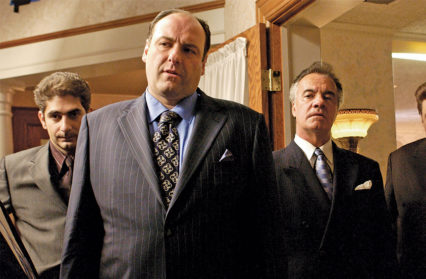Jon Gower tells a story of how he was once approached for the culturally golden and iconic The Sopranos, twenty years since its release.

His interviewer, a man from the BBC, was a little nonplussed when he kicked off with The Wire. “Could you make it, er, a bit more serious?” he asked. Gower said he was serious.
It is commonplace now, but Gower was saying it a few years ago. If Charles Dickens were alive in the twenty-first century he would be at a whiteboard furiously stabbing out multi-stranded plotlines for box-sets.
Television’s modern age began 20 years in January 1999. The critics knew at once that they were watching something good. The New York Times view was that “it just may be the greatest work of American popular culture of the last quarter-century”. Now the verdict is not so sure. Millions of words swirl in chat as to whether The Sopranos is greater than Breaking Bad. Or Mad Men. In fact, they are distinct and different.
Culture marries the public and the private. I have seen The Sopranos twice; the first time as it unfolded, the second in a more leisurely, ruminative way over two years, 2014-2015. I was not there quite for the beginning. My father-in-law had seen a thing or two in his time. In infancy, his mother would pop him inside a stout chest of drawers for protection when the Civil War threatened to come too close to the family home in Dublin. He had a particular liking, and a chuckle, for Livia, Tony’s mother, her malice and taste for conspiracy undimmed by late age and the sedateness of her care home.
Livia is cannily named. All great art carries a tinge of archetype in it while being particular to itself. Walter White is a twenty-first-century Faustus. The genius of the concept is that The Sopranos is located within the genre but rendered wholly new. There is not a Long Island mansion or a Lake Tahoe to be seen, not the slightest wish to be other than hoodlums. In one late scene a group watches TV and a character both mocks and mimics Al Pacino’s “Just when I thought I was out, they pull me back in.”
That “in” is a running motif. The bad guys never collectively get their comeuppance at the hands of the authorities. But individually they are felled regularly and bloodily, their running stories fuelling each separate season. Eugene Pontecorvo is a secondary character, an enforcer and hit-man, who comes to the centre in Season 5. All he wants is to retire to Florida, a request that needs approval that is casually denied. To be born into the Mob really is the Hotel California.
The story-makers have an advantage in that new characters may appear by dint of their release from prison. Some new arrivals are downright murderous and all are malicious. Sister Janice reaches a high point of black comedy when she steals Svetlana Kirilenko’s prosthetic leg. Tony Blundetto, a cousin, has a post-prison wish to be legitimate. Inevitably, he sabotages his own business and plunges into inter-family disputes.
The repetitiveness of quotidian life settles the fate of Vito Spatafore. In escape to New England, he finds both regular work and a relationship. The sheer dullness of life sends him back to New Jersey and an eventual bloody end. Vito is gay and one aspect of re-watching is to see how little social change impacts this community. Mad Men is acute on women, race and class. The role of women in The Sopranos never changes. Alternate sexualities are forbidden, killable even. The few of the younger generation who escape doing so only by relocating thousands of miles away.
Richie Aprile, Adriana La Cerva, Meadow, Corrado, Ralph Cifaretto, Christopher Moltisanti, Furio Giunta, Davey Scatino, Artie Bucco, Johnny Sack, Salvatore “Big Pussy” Bonpensiero, Gloria Trillo are just a dozen characters within dozens. Murder, car crash, cancer, bankruptcy and suicide are their assorted fates. The endings are dramatic but the long-form, multi-episode plotting, inaugurated by The Sopranos, means that the finales are never rushed. The plotting has all the leisured pacing that Dickens was able to give to his inexorable Jarndyce versus Jarndyce.
The ending was cause for debate but it was entirely right. Whether Tony goes in his fifties or a decade on makes no difference. He is never going to rest easy or know tranquillity. The world of smallness, contained and constrained with clan and crime, gives no comfort. We watch, and we watch again because The Sopranos is ultimately rich in an affirming morality.
The culturally golden The Sopranos is still available through live streaming platforms.
Jon Gower is a regular contributor to Wales Arts Review.











